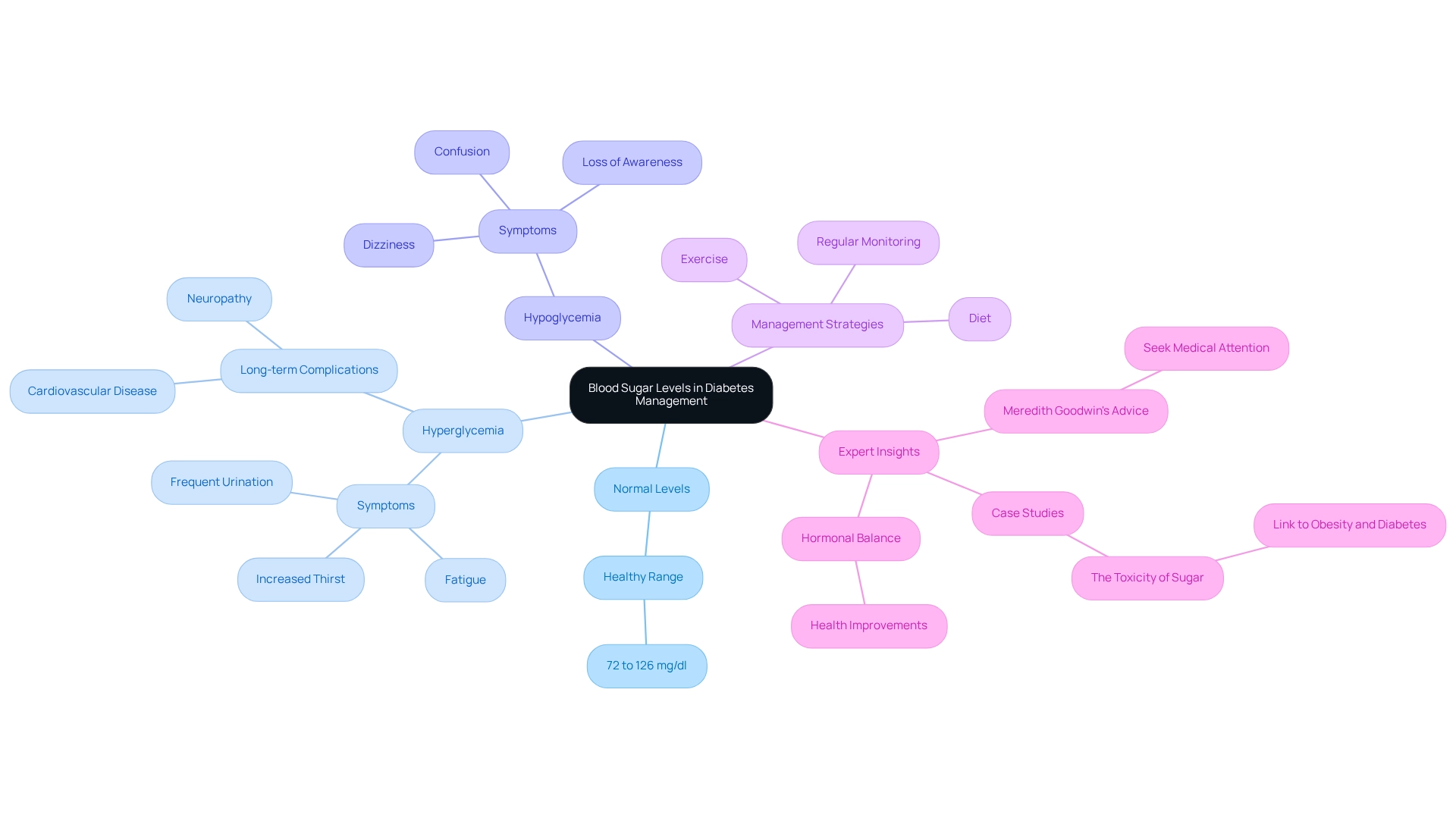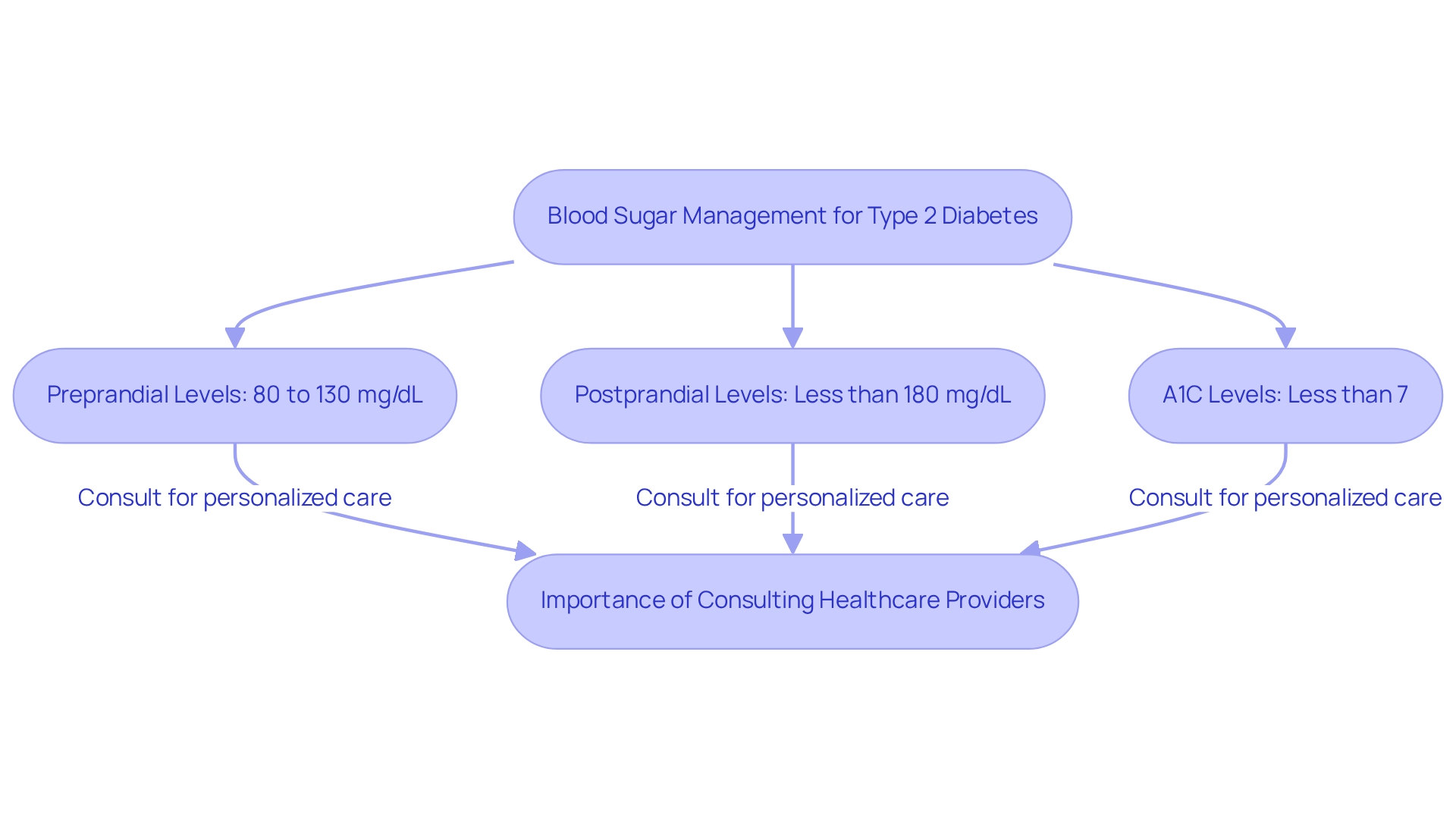Overview
This article highlights the vital role of maintaining a specific blood sugar range for effectively managing Type 2 Diabetes. It's important to understand that target levels are crucial for preventing complications. The American Diabetes Association provides recommended blood sugar ranges that can guide you on this journey.
You may find that making lifestyle changes—such as adjusting your diet and increasing your exercise—can significantly help you achieve and sustain these levels. Remember, these changes not only assist in managing your blood sugar but also improve your overall health outcomes. You're not alone in this journey; many have walked this path and found success.
We are here to support you every step of the way, encouraging you to seek out resources and connect with others who share similar experiences. Together, we can work toward a healthier future.
Introduction
In the intricate landscape of diabetes management, understanding blood sugar levels is a cornerstone for effective health control. These levels, which indicate glucose concentration in the bloodstream, are crucial for preventing both immediate and long-term complications associated with Type 2 Diabetes. It's understandable to feel overwhelmed by this information, but the American Diabetes Association provides specific target ranges and expert insights that can empower you to make informed decisions about your health.
Moreover, adopting lifestyle changes—such as dietary adjustments and stress management—can significantly enhance blood sugar control. This article explores the importance of blood sugar regulation, the recommended targets for individuals managing diabetes, and practical lifestyle strategies that can lead to improved health outcomes. Remember, you’re not alone in this journey; we are here to support you every step of the way.
Define Blood Sugar Levels and Their Importance in Diabetes Management
Glucose concentrations, or the amounts of glucose in your blood, indicate how much glucose is present in your circulatory system at any given moment. For those managing Type 2 Diabetes, it’s crucial to maintain their levels within the diabetes type 2 blood sugar range to prevent both immediate and long-term complications. Generally, healthy glucose levels upon waking range from 72 to 126 mg/dl. When glucose levels are elevated, a condition known as hyperglycemia can occur, which may present symptoms like increased thirst, frequent urination, and fatigue. Conversely, low glucose levels, or hypoglycemia, can lead to dizziness, confusion, and, in severe cases, loss of awareness.
Understanding these measures is vital for making informed choices about your diet, exercise, and medication, ultimately enhancing your ability to manage the condition effectively. Regular monitoring is essential; it allows for timely adjustments to treatment plans, fostering better health outcomes. Recent studies emphasize the connection between glucose levels and diabetes complications, highlighting that poor management can lead to serious health issues over time, such as cardiovascular disease and neuropathy. Statistics indicate that persistent hyperglycemia significantly increases the risk of these long-term health problems.
Experts stress the importance of glucose management. For instance, Dr. Meredith Goodwin advises that if you have concerns about your blood glucose, seeking medical attention promptly is essential. Additionally, case studies reveal the detrimental effects of excessive sweetener intake, with specialists identifying these substances as toxins that contribute to obesity and metabolic disorders. This perspective encourages a thorough evaluation of eating habits, highlighting the importance of being mindful of carbohydrate consumption.
Moreover, focusing on hormonal balance can lead to significant health improvements, further supporting effective management of glucose-related conditions. The impact of glucose concentrations on the diabetes type 2 blood sugar range and complications is considerable; thus, understanding and regulating glucose levels is not just a routine task but a crucial aspect of thriving with diabetes. Regular glucose monitoring acts as a proactive measure, empowering you to stay informed and make necessary adjustments to your management strategies. Remember, you're not alone in this journey; we are here to support you every step of the way.

Explore Normal and Target Blood Sugar Ranges for Type 2 Diabetes
For individuals managing Type 2 Diabetes, it’s important to understand the diabetes type 2 blood sugar range outlined by the American Diabetes Association (ADA) to guide effective management. These targets can help you feel more in control of your health:
- Before meals (preprandial): 80 to 130 mg/dL (4.4 to 7.2 mmol/L)
- 1 to 2 hours after meals (postprandial): Less than 180 mg/dL (10.0 mmol/L)
- A1C (average blood sugar over 2-3 months): Less than 7% (or less than 154 mg/dL)
Understanding these guidelines is essential, as blood sugar levels can vary based on personal health conditions. Regular discussions with your healthcare provider are crucial for tailoring these targets to your individual needs. As Louise Morales-Brown states, "A doctor can assist an individual in creating a care plan," highlighting the importance of expert advice in effectively managing your condition.
Grasping these metrics can empower you to make informed decisions about your health. Maintaining glucose concentrations within the recommended diabetes type 2 blood sugar range can significantly reduce the likelihood of complications related to high blood sugar. Statistics show that adherence to these targets is linked to improved patient outcomes, underscoring the importance of personalized care plans. The ADA emphasizes that while these ranges serve as general guidelines, individual goals may differ. Collaborating with healthcare experts to create a personalized strategy can help you manage your condition effectively.
By identifying when glucose concentrations are excessively high or low, you can take prompt action, ultimately enhancing your overall health and well-being. Remember, you are not alone in this journey. T2DSolutions is here to provide diverse educational resources and support features for individuals navigating their diabetes management journey, making it a valuable resource for newly diagnosed patients. We are here to support you every step of the way.

Adopt Lifestyle Changes to Maintain Healthy Blood Sugar Levels
Sustaining healthy glucose concentrations is essential for maintaining the diabetes type 2 blood sugar range, requiring a thoughtful approach that includes dietary choices, physical activity, and stress management. Here are some effective lifestyle changes that T2DSolutions can help you implement:
-
Balanced Diet: Focus on whole foods like vegetables, whole grains, lean proteins, and healthy fats while reducing processed items and added sugars. Current dietary guidelines emphasize the importance of nutrient-rich foods for managing the diabetes type 2 blood sugar range. T2DSolutions offers resources and guidance on meal planning to support these dietary choices.
-
Regular Exercise: Aim for at least 150 minutes of moderate-intensity aerobic activity each week, such as brisk walking or cycling. Regular physical activity not only enhances insulin sensitivity but also plays a vital role in lowering glucose levels, making it essential for managing the diabetes type 2 blood sugar range. T2DSolutions provides information on local exercise programs and community support to help you stay active.
-
Weight Management: Achieving and maintaining a healthy weight can lead to significant improvements in the diabetes type 2 blood sugar range. Research shows that even modest weight loss can positively affect diabetes management. T2DSolutions can connect you with tailored resources for effective weight management strategies.
-
Stress Reduction: Consider incorporating stress management techniques like mindfulness, yoga, or deep breathing exercises into your routine. Since stress can adversely affect glucose levels, it is crucial to find effective ways to cope in order to maintain a healthy diabetes type 2 blood sugar range for your overall well-being. T2DSolutions offers workshops and resources to help you learn these techniques.
-
Regular Monitoring: Keeping track of your glucose levels consistently helps you understand how different foods and activities impact your diabetes type 2 blood sugar range. This knowledge empowers you to make informed decisions regarding your diet and lifestyle. T2DSolutions provides tools and support for effective blood sugar monitoring.
The significance of these strategies is underscored by the alarming statistic of 267,000 emergency department visits for hyperglycemic crises in 2020, highlighting the urgent need for enhanced diabetes management and education. As Mary Beth Weber, PhD, MPH, emphasizes, "Collaborating with community-based lifestyle programs, establishing patient referrals to such programs, creating multidisciplinary teams to provide patient education and follow-up, training physicians on effective brief counseling, and using health information technologies to promote behavior change represent the most promising strategies." By adopting these lifestyle changes and utilizing the resources available through T2DSolutions, you're taking a significant step toward effectively managing Type 2 Diabetes, complementing medical interventions such as insulin use. Remember, you're not alone in this journey; we are here to support you every step of the way.

Conclusion
Understanding and managing blood sugar levels is essential for individuals living with Type 2 Diabetes. It's important to recognize your blood sugar levels and aim for the target ranges set by the American Diabetes Association. By doing so, you can significantly reduce the risk of complications associated with diabetes, including cardiovascular disease and neuropathy.
Adopting a balanced diet, engaging in regular physical activity, managing stress, and consistently monitoring blood sugar levels are vital components of an effective diabetes management plan. These lifestyle strategies empower you to take control of your health, providing a framework for making informed decisions that positively impact your overall well-being.
The journey of managing diabetes may seem daunting, but remember, with the right knowledge and support, it is possible to lead a healthy and fulfilling life. Embracing these insights and resources can pave the way toward improved blood sugar control. You're not alone in this journey; there are many who understand your challenges and are here to support you every step of the way.
Frequently Asked Questions
What do glucose concentrations indicate?
Glucose concentrations indicate the amount of glucose present in your blood at any given moment.
Why is it important for individuals with Type 2 Diabetes to manage their glucose levels?
It is crucial for individuals with Type 2 Diabetes to maintain their glucose levels within the diabetes type 2 blood sugar range to prevent both immediate and long-term complications.
What are the healthy glucose levels upon waking?
Healthy glucose levels upon waking generally range from 72 to 126 mg/dl.
What symptoms can occur with elevated glucose levels?
Elevated glucose levels can lead to hyperglycemia, which may present symptoms like increased thirst, frequent urination, and fatigue.
What are the symptoms of low glucose levels?
Low glucose levels, or hypoglycemia, can cause dizziness, confusion, and, in severe cases, loss of awareness.
How does monitoring glucose levels contribute to diabetes management?
Regular monitoring of glucose levels allows for timely adjustments to treatment plans, enhancing overall health outcomes.
What long-term health issues can arise from poor glucose management?
Poor glucose management can lead to serious long-term health issues, such as cardiovascular disease and neuropathy.
What advice does Dr. Meredith Goodwin give regarding blood glucose concerns?
Dr. Meredith Goodwin advises that individuals with concerns about their blood glucose should seek medical attention promptly.
How can excessive sweetener intake affect health?
Excessive sweetener intake can be detrimental, as specialists identify these substances as toxins that contribute to obesity and metabolic disorders.
What role does hormonal balance play in glucose management?
Focusing on hormonal balance can lead to significant health improvements and support effective management of glucose-related conditions.
Why is understanding and regulating glucose levels important for individuals with diabetes?
Understanding and regulating glucose levels is crucial for thriving with diabetes, as it helps manage the condition and prevent complications.



